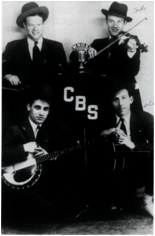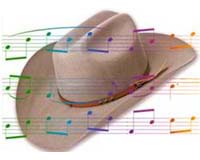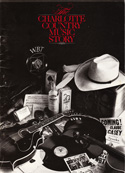Zeke and Wiley Morris
As a brother duet or as members of other ensembles, Wiley and Zeke Morris were among the most active performers in Charlotte’s country music heyday in the 1930s and ’40s.
Claude “Zeke” Morris was born on May 9, 1916 at Old Fort, North Carolina, a few miles east of Asheville and learned to play the mandolin as a young man. Wiley, born February 1, 1919, became proficient on guitar. In 1933,Claude left his mountain home for the mill villages at Concord near Charlotte. He came at the urging of former neighbors J. E. and Wade Mainer who had taken jobs in the mill but soon found they could earn money by playing the old mountain music for appreciative fellow workers. J. E. gave Claude the hayseed nickname Zeke, in keeping with the music’s rural image, and together with Concord resident John Love they formed the stringband Mainer’s Mountaineers.

J. E. Mainer’s Mountaineers debuted on WSOC and WBT radio stations in Charlotte and quickly became one of the most popular stringbands of the day. Crazy Water Crystals patent medicine company sent them on a tour of radio stations throughout the Carolinas and as far south as New Orleans. In 1935,the Mountaineers recorded their biggest selling song, Maple on the Hill, for RCA Victor. The recording featured the vocal duet of Wade Mainer and Zeke Morris.
Wade and Zeke made their first records on their own in Charlotte February 15, 1936. Included were Maple on the Hill, Part 2, and Going to Georgie, still a favorite with old-time stringbands. The duo remained with the Mountaineers until later that year. A dispute with their radio sponsor in Raleigh caused Wade and Zeke to go out on their own while J. E. and the rest of the Mountaineers continued to play for Crazy Water Crystals. (An older brother, guitarist George “Sambo” Morris, did a later stint with the Mountaineers.) Wade and Zeke added fiddler Homer Sherrill to their line-up, performing on radio as the Smiling Rangers, and recording as a trio for RCA in Charlotte on October 12, 1936. When Wade left in late 1937 to form a new band, the Rangers brought brother Wiley down from the mountains.
For the remainder of the 1930s and into the mid-1940s, Zeke and Wiley Morris broadcast and recorded in a variety of settings. Together they recorded for RCA in Charlotte on Jaunary 26, 1938 and on November 14, 1945, and in nearby Rock Hill, South Carolina on September 29, 1938 and on February 5, 1939. Zeke also worked as a sideman on some Charlie Monroe recordings during the two Rock Hill sessions. Separately the Morrises spent periods on radio in Raleigh, Danville, Asheville and Johnson City. Together they appeared on WBT Charlotte for BC Headache Powders, and in Knoxville and Spartanburg. While in Spartanburg they hired an unknown, young banjo player named Earl Scruggs, and helped launch the career of one of the giants of bluegrass.
In all, Zeke and/or Wiley Morris contributed to well over one hundred of the more than fifteen hundred songs recorded in the Charlotte area by RCA up through 1945. Of the thirty-three sides that featured the Morris Brothers as band leaders, the most famous is Let Me Be Your Salty Dog. They first recorded the tune on September 29, 1939 in the Andrew Jackson Hotel in downtown Rock Hill. The song was released on an RCA Bluebird disc, the budget label on which all of that company’s country recordings were issued. In the early 1940s,RCA discontinued its Bluebird line, but asked the Morris Brothers to record the song again for their main label. The second recording, entitled Salty Dog Blues, was cut at the Hotel Charlotte in November of 1945, and proved to be a major seller. The new arrangement featured Zeke’s rapid-fire mandolin and sounds very much like Bill Monroe’s instrumental style of a few years earlier.
Shortly after the 1945 session, Zeke and Wiley gave up the lives of professional musicians. Both were now in their late twenties and were ready to settle down to a more stable home life. Since the late 1940s, they have lived in Black Mountain, North Carolina, a few miles from their birthplace, and worked as auto body repairmen. In 1985 they continue to enjoy playing, having appeared at the prestigious Newport Folk Festival in the early 1960s and recently on the Nashville Network’s highly rated Fire on the Mountain television show.
— from George Holt, ed., The Charlotte Country Music Story (Spirit Square Arts Center and North Carolina Arts Council, 1985)

Musicians who took part in the Charlotte Country Music Story concerts
Briarhoppers and Charles Crutchfield
Joe and Janette Carter
Claude Casey
Tommy Faile
George Hamilton IV
Snuffy Jenkins and Homer “Pappy” Sherrill
Johnson Family Singers and Betty Johnson
Fred Kirby
Roy Lear
Wade Mainer
Bill Monroe
Zeke and Wiley Morris
Sam Poplin
Red Clay Ramblers
Arthur Smith
Tennessee Ramblers with Cecil Campbell and Harry Blair
Charlotte/Rock Hill Recordings available on CD (36 page pdf)

